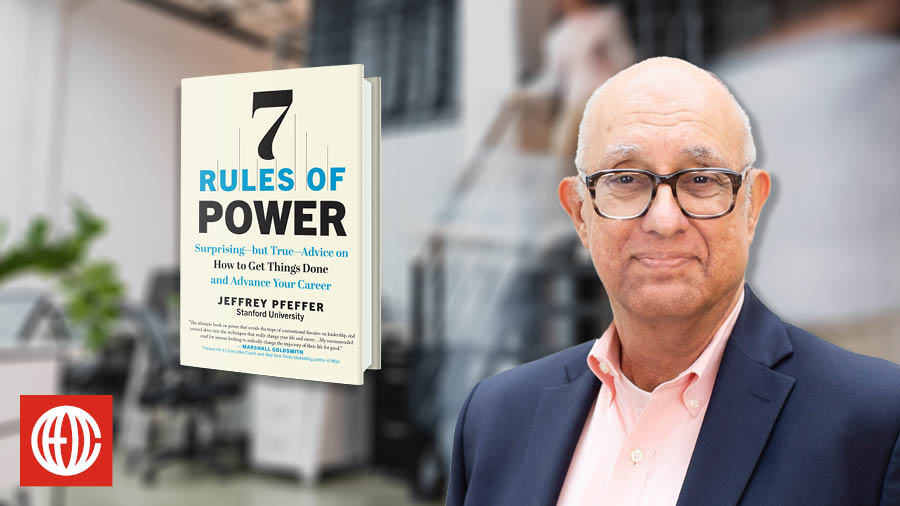
Guest: Jeffrey Pfeffer, the Thomas D. Dee II Professor of Organizational Behavior at the Graduate School of Business, Stanford University, where he has taught since 1979. Prof. Pfeffer is the author or co-author of 16 books, including his latest, 7 Rules of Power: Surprising–but True–Advice on How to Get Things Done and Advance Your Career.
Overview: The tools that allow business leaders to gain, increase, and retain their power are neutral. It’s how you use those tools that determines how far others will be willing to follow you and how BIG your company will get.
On today’s show, Jeffrey Pfeffer discusses his 7 Rules of Power, how power is and isn’t distributed through successful organizations and societies, and the choices we all have to make as we strive to Make BIG Happen.
Jeffrey Pfeffer on why some people gain power and others don’t:
“I assume everybody thinks they’re a good person. I think one of the things that has caused the problems that you see in the world is that power goes to the people who are willing to learn and use what it takes to become successful. I don’t think there’s anything unethical with any of the 7 Rules of Power: getting out of your own way, or breaking the rules, or showing up in a powerful fashion, or building a powerful brand, or networking relentlessly, or using your power, or having self-descriptions of yourself that empower rather than disempower you. I don’t think any of those things are unethical. But I think people sometimes say, ‘This is a game that I don’t want to play.’ And if you opt out, not everybody’s going to opt out.“
Jeffrey Pfeffer on overcoming imposter syndrome:
“So many people have what’s called in the research literature ‘imposter syndrome.’ They don’t think they’re as good as other people. They don’t think they are deserving of power. They don’t think they’re as smart as other people at Stanford Business School. They believe they’re the admission mistake. If you don’t think you deserve to be a CEO, nobody’s going to make you a CEO. So part of getting out of your own way is to say, ‘I deserve a high-level position. I deserve this stuff.’ And to not use descriptors of yourself that disempower you.”
Jeffrey Pfeffer on risk, return, and breaking the rules:
“In finance we understand the trade-off between risk and return. That’s true in careers as well. That’s true in strategy as well. No guts, no glory. No risk, no return. Sometimes the rule-breaking leads to catastrophe, in the case, for instance, of Elizabeth Holmes. In some cases, the rule-breaking leads to enormous success. Jeff Bezos broke many rules with respect to the building of Amazon, including the rule that says you have to be profitable for many years. If you’re going to achieve great things, you have to basically do things that are different. It is impossible to earn extraordinary returns by benchmarking. You benchmark your way to the middle. You cannot benchmark your way to the top.”
Links:
Your Biggest Blind Spot? It’s Probably Ego, According to Our Coaches – Blind spots, if not addressed, can create long-lasting impacts on your business. But once you identify your blind spots, you can implement changes to help work around them.
The Top 5 Leadership Qualities of CEOs Who Have Led Their Companies to Successful Exits – A successful exit is not an end. It’s a culmination of everything that your company has accomplished so far, and of all your skills as the CEO.
About CEO Coaching International
CEO Coaching International works with CEOs and their leadership teams to achieve extraordinary results quarter after quarter, year after year. Known globally for its success in coaching growth-focused entrepreneurs to meaningful exits, CEO Coaching International has coached more than 1,000 CEOs and entrepreneurs in more than 60 countries and 45 industries. The coaches at CEO Coaching International are former CEOs, presidents, or executives who have made BIG happen. The firm’s coaches have led double-digit sales and profit growth in businesses ranging in size from startups to over $10 billion, and many are founders that have led their companies through successful eight, nine, and ten-figure exits. Companies working with CEO Coaching International for two years or more have experienced an average revenue CAGR of 31% (2.6X the U.S. average) and an average EBITDA CAGR of 52.3% (more than 5X the U.S. average).
Learn more about executive coaching | Meet our world-class coaches









